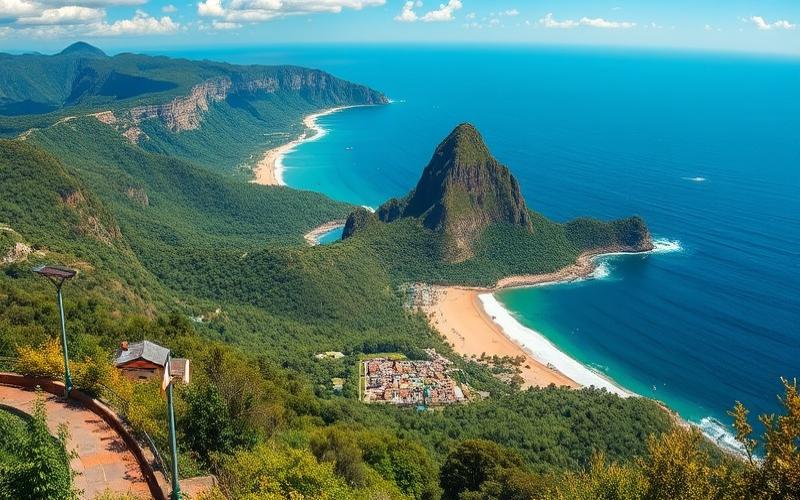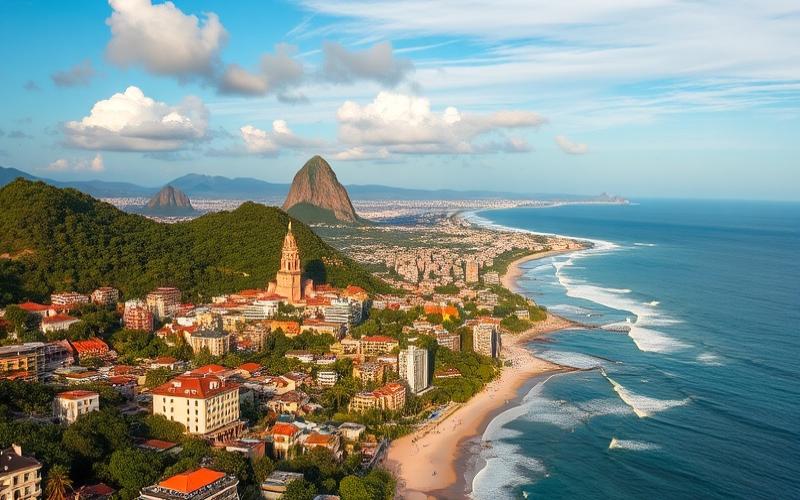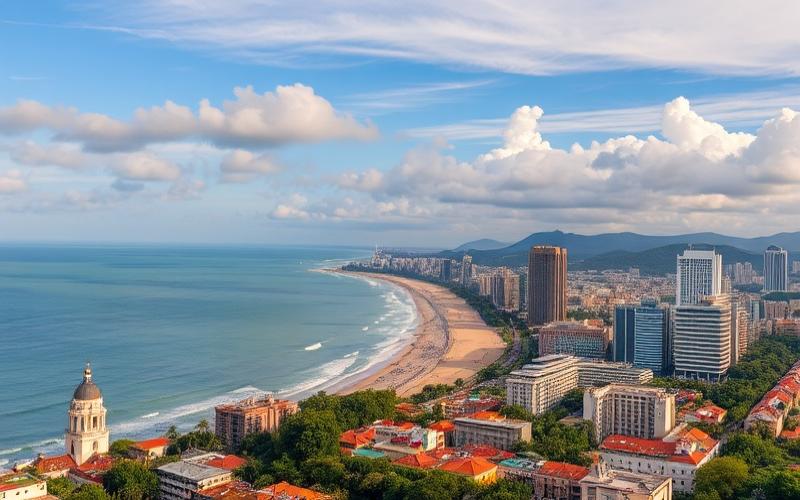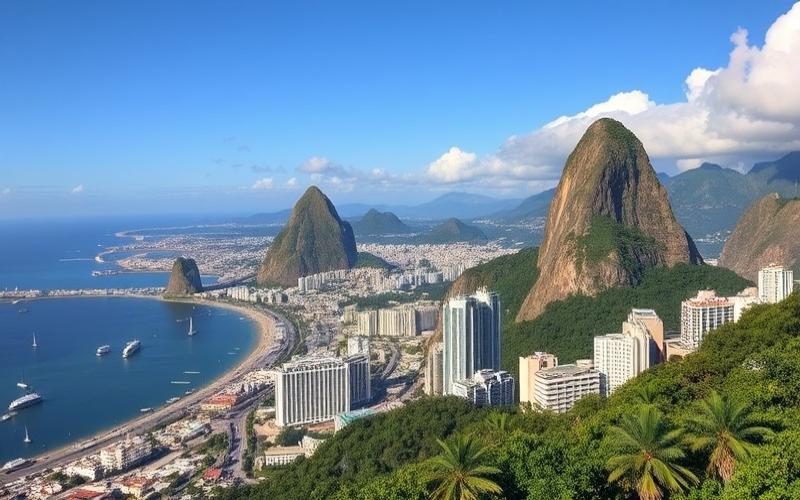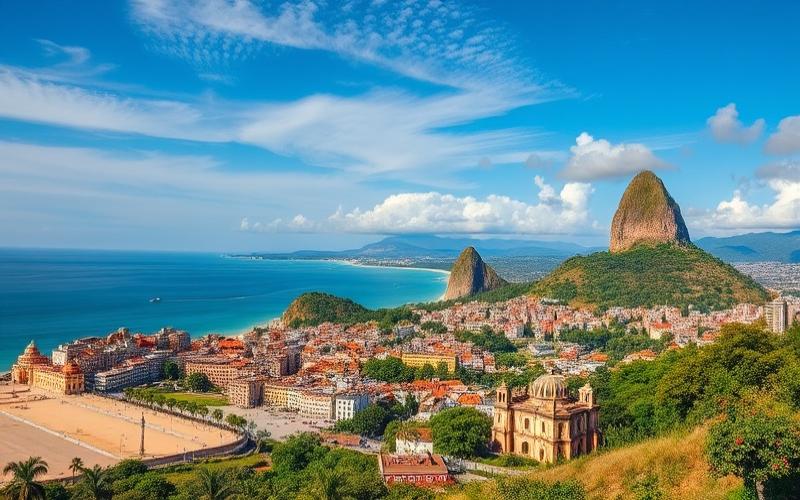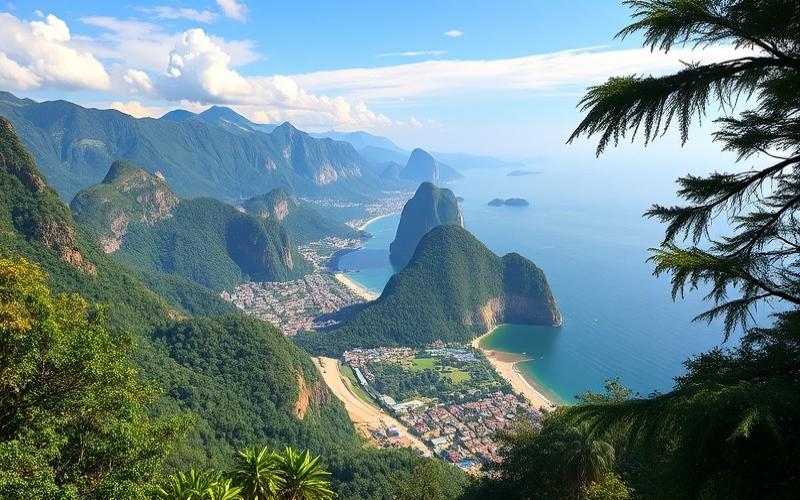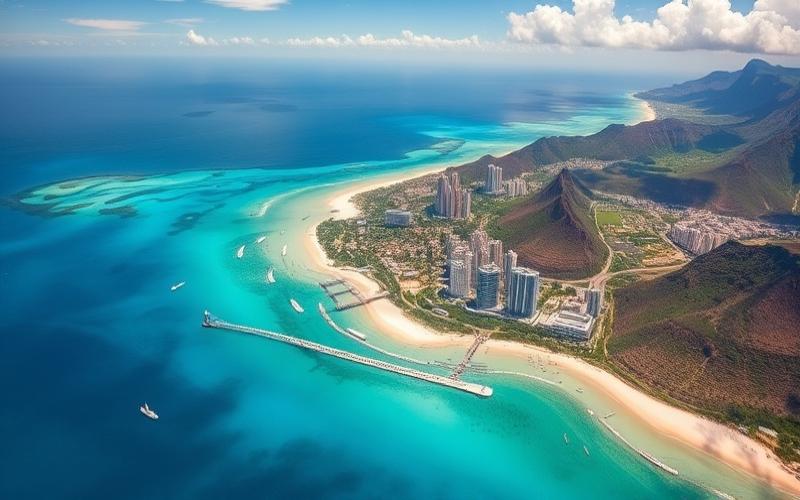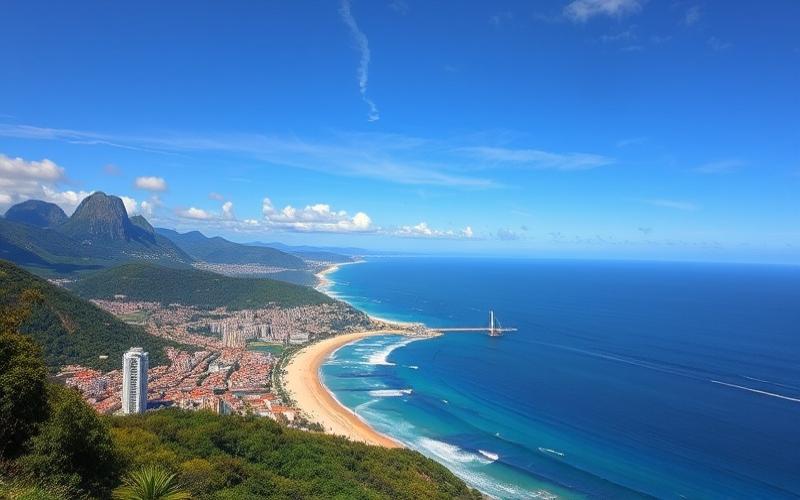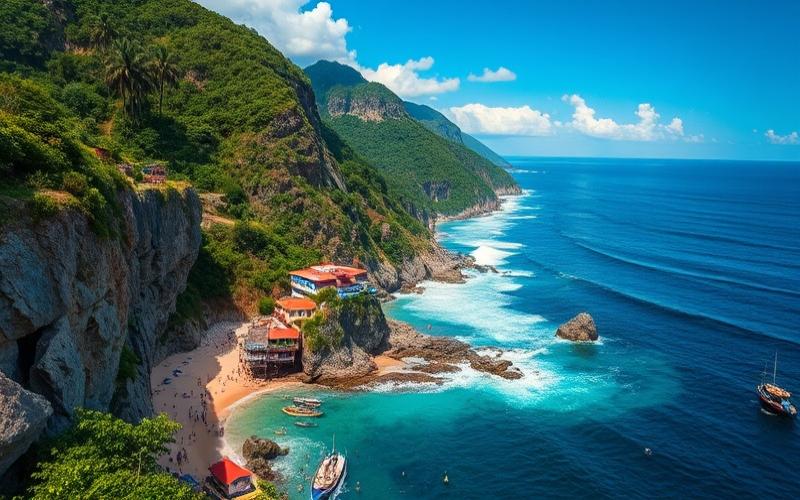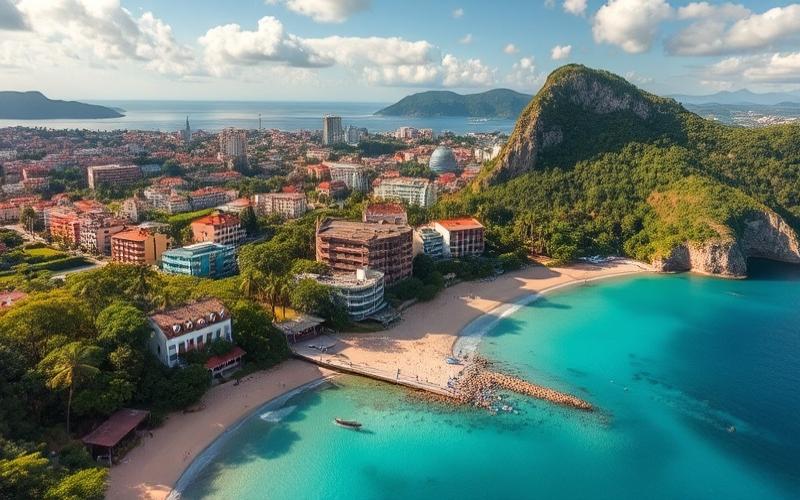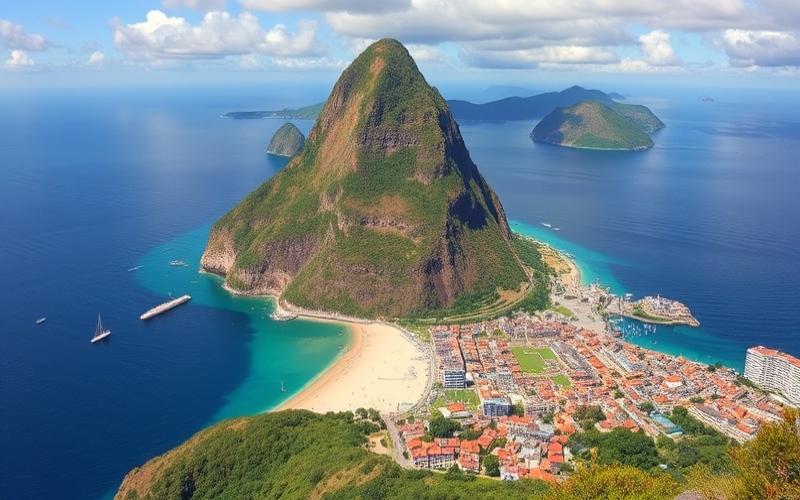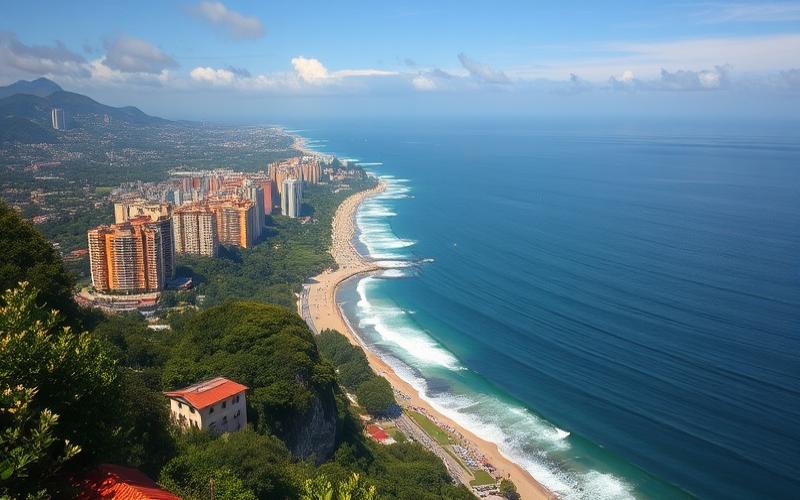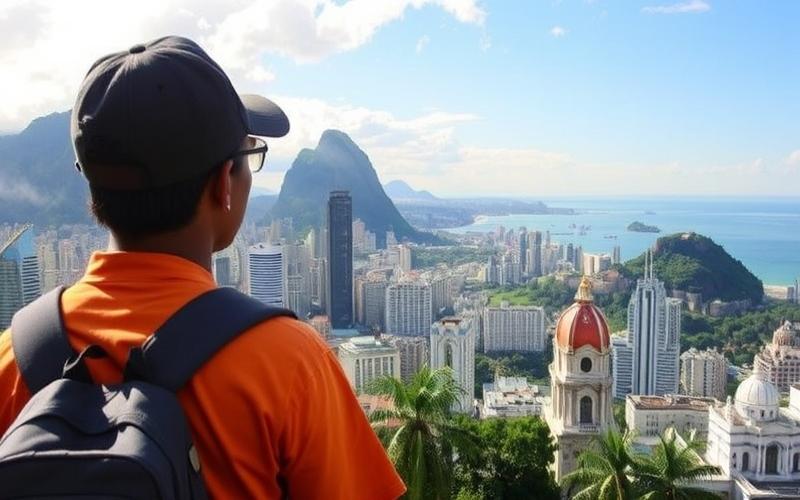
 Published on and written by Cyril Jarnias
Published on and written by Cyril Jarnias
Relocating to a vibrant and dynamic country like Brazil can be an extraordinary experience, but it’s essential to take certain precautions to ensure a smooth transition. With its vast metropolises such as Rio de Janeiro and São Paulo, where life can be as wonderful as it is complex, understanding safety issues is crucial for expatriates.
This practical guide aims to provide sound advice for navigating Brazilian streets with peace of mind, emphasizing the importance of being vigilant without giving in to fear. Discover how to adopt simple gestures and common-sense habits that help transform your stay in Brazil into a memorable and enriching adventure.
Is Brazil a Safe Destination for Expatriates?
Brazil has varying levels of safety across regions, with high crime rates in some major urban centers and specific risks that expatriates need to be aware of.
Recent Safety Statistics
- Crime rates remain high nationwide, particularly in large cities like Rio de Janeiro, São Paulo, Salvador, Recife, Porto Alegre, and certain peripheral areas of Brasilia.
- Violent crimes (armed robberies, carjackings, burglaries) are frequent in these cities as well as major tourist sites (Ipanema/Copacabana beaches, Corcovado trail).
- Some areas are particularly discouraged at night or outside typical tourist routes: favelas, isolated or informal neighborhoods (“comunidades”), “satellite cities” around Brasilia (Ceilândia, Paranoá…).
- The northern and western border regions are considered risky due to trafficking and cross-border criminal activities.
| Region | Risk Level | Recommended Precautions |
| Rio/São Paulo/Salvador/Recife | High | Increased vigilance; avoid certain neighborhoods |
| Foz do Iguaçu/Pantanal | Moderate | Lower risks but caution still required |
| Northern & western border areas | Very High | Travel not recommended |
| Gated residential areas | Low/Moderate | Enhanced security |
Measures to Ensure Your Safety
- Stay aware of your surroundings at all times.
- Avoid going out after dark, especially outside secure or tourist areas.
- Prefer moving in groups rather than alone.
- Limit displaying valuable items (watches, visible phones…).
- Do not resist during an assault; prioritize personal safety over material possessions.
Summary list:
- Stay regularly informed through official travel advisories
- Use official taxis/recognized apps for transportation
- Choose housing with a reliable security system
- Always carry the local emergency number
Expatriate Testimonials
“In daily life in São Paulo, I don’t feel constantly threatened but I remain very vigilant whenever I go out. There’s a strong police presence but we avoid certain neighborhoods after 7 PM.”
— Laurent M., French expatriate
“In Recife I experienced some minor non-violent thefts. For me the key is really adaptation: never give the impression that you’re lost or display your personal belongings.”
— Carla D., Portuguese expatriate
Many testimonials emphasize that the feeling of insecurity decreases over time through learning local customs and developing social networks.
Role of Companies and Government Agencies
Large multinational companies established in Brazil often provide:
- Support upon arrival (seminars on local security)
- Internal services dedicated to security matters for their foreign employees
- Secure housing sometimes located in gated condominiums
Embassies also offer:
- Regular email/SMS advice on evolving local risks
- 24/7 consular assistance in case of serious incidents involving foreign nationals
- Localized networks enabling mutual aid among expatriates
In case of major issues:
- Contact your embassy/consulate immediately;
- Use local dedicated emergency numbers;
- Potentially benefit from psychological support offered by some international companies.
Potential Impact on Quality of Life & Benefits Despite Challenges
Perceived insecurity can initially affect psychological well-being: spontaneous limitation of nighttime or independent travel; necessary adaptation of family lifestyle. However:
Notable advantages:
- Relatively low cost compared to other emerging destinations
- Easier access to qualified international workforce
- Exceptional climate quality/typically Brazilian friendly lifestyle
- Regional economic dynamism offering multiple professional opportunities
Thus many expatriates consider their experience overall positive despite these constraints thanks to strict adherence to daily preventive measures and support offered by their companies/local institutions.
The key remains constant vigilance combined with gradual integration.
Good to Know:
Some regions like Florianópolis and Brasilia are considered safer, while in cities like Rio de Janeiro, it’s advisable to adopt enhanced security measures such as using location apps. Companies and local organizations often provide security training for newcomers to facilitate smooth adaptation.
Keys to Living Peacefully in Brazil
Keys to Living Peacefully in Brazil: Practical Tips for Expatriates
Understanding Local Culture and Adapting to Customs
- Learn to respect social norms, such as more flexible punctuality or the importance of human contact (warm greetings, sense of community).
- Adopt an open attitude and observe local habits to better integrate. Many expatriates report that accepting cultural differences greatly facilitates their daily life.
Daily Safety in Large Cities
- Avoid walking alone at night or in sparsely populated neighborhoods.
- Stay vigilant during your movements: keep your phone stored, avoid displaying valuable items, carry only the essentials (one bank card, some cash).
- Prefer official taxis or ride-sharing services booked through apps rather than hailing them on the street.
- During an assault: offer no resistance; always have a small amount to hand over if needed.
- Exercise caution during gatherings (keep bag closed and close to body, watch for pickpockets).
Choosing a Residential Neighborhood
| Recommended Criteria | Examples/Concrete Advice |
|---|---|
| Prefer reputedly safe neighborhoods | In Rio: Leblon, Ipanema, Copacabana |
| Consult with expatriates | Forums and local groups |
| Prioritize well-served areas | Proximity to services & transportation |
Example: An expatriate settled in Rio strongly recommends avoiding certain peripheral neighborhoods and prefers the South Zone where they feel safer.
Staying Informed Through Traveler Reviews/Expatriate Networks
- Regularly consult specialized forums and social media groups dedicated to French people in Brazil to get recent feedback on evolving local situations.
- Don’t hesitate to seek practical advice directly from experienced residents.
Importance of Learning Portuguese
Learning Portuguese is essential:
- To understand local users and avoid misunderstandings
- To build connections with neighbors/colleagues
- To access employment more easily
Many expatriates report that a basic level is often sufficient initially but that progressing quickly offers daily autonomy and confidence.
Health & Insurance: Essential Measures
- Check your vaccines before departure (yellow fever, hepatitis A/B…).
- Bring a sufficient stock of prescribed medications with translated prescription if needed.
- Subscribe to international health insurance covering routine care/hospitalization; the Brazilian public system can be saturated or uneven across regions.
Useful Numbers:
- SAMU (medical emergencies): 192
- Fire Department: 193
- Military Police: 190
- French Embassy Brasilia emergency: +55–61–3222–3820
Concrete example: Several French people who moved outside Europe emphasize having had to frequently consult private doctors due to lack of available slots in the public system. They stress the crucial importance of good health coverage upon arrival.
Summary Checklist
- Maintain discretion in clothing/personal items
- Avoid isolated nighttime outings
- Choose residential neighborhood after thorough research
- Connect through experienced French/Brazilophile networks
- Take intensive Portuguese courses upon settling
- Always keep paper copies/scans of passport & emergency contacts
Good to Know:
To live peacefully in Brazil, it’s essential to learn Portuguese for better integration, choose safe neighborhoods according to advice from experienced residents, and subscribe to appropriate health insurance.
Tips for Enhancing Daily Security
Current Security Situation in Brazil:
Brazil faces high urban insecurity in most large cities. Expatriates are particularly exposed to snatch thefts, assaults, and scams, especially in public places and public transportation. Some central areas of Brasilia (Plan Piloto, Lago Sul, Lago Norte) benefit from enhanced security due to embassy presence and police forces, but it’s nevertheless important to remain very vigilant there.
Practical Recommendations for Expatriates
Vigilance in Public Places
- Avoid straying from main thoroughfares or tourist areas.
- Never display valuable items (phones, jewelry).
- Prefer discreet bags worn in front.
- Stay attentive during ATM withdrawals.
Security During Financial Transactions
- Favor card payments over cash use.
- Use only ATMs located in secure shopping malls or banks with security.
- Activate SMS notifications on your bank accounts to detect suspicious transactions.
- Systematically check for suspicious devices on payment terminals.
Housing Choice
| Criterion | Concrete Recommendation |
|---|---|
| Neighborhood | Prefer neighborhoods with private surveillance and access control; avoid isolated peripheries. |
| Residence | Opt for a gated condominium or guarded residence (video surveillance, visitor control). |
| Nearby Services | Proximity to private hospitals, international schools, and secure businesses. |
Precautions During Travel
- Avoid nighttime travel outside safe neighborhoods.
- Prefer official taxis or recognized ride-sharing apps (do not hail taxis on the street).
- Inform a contact when making long-distance trips or traveling outside known urban areas.
Prevention Against Common Scams
| Scam | How to Avoid It |
|---|---|
| Fake accident theft | Never exit vehicle in case of minor isolated “bump”; call police if needed |
| Banking scam | Never communicate codes by phone/messaging; verify identity before any transfer |
| Fake police officers | Request presentation of official badge; refuse any unusual requests |
Response During Confrontation
- Stay calm and cooperate without physical resistance: surrender belongings without argument if threatened.
- Discreetly observe useful details (appearance/attacker/clothing/car) without risking escalation.
- File a report at the local police station as soon as possible after reaching safety.
Smart Use of Technology
- Install a local mobile app dedicated to personal security enabling quick alerts (“Botão do Pânico”, partner apps with ride-sharing services…)
- Register with the consulate on Ariane to receive official alerts
- Actively participate in a local WhatsApp/Facebook group reserved for expatriates to:
- Exchange recent information about risky neighborhoods/local events
- Request practical advice tailored to your city/neighborhood
Additional Suggestions
To live peacefully in Brazil:
- Subscribe to appropriate international health insurance,
- Keep important documents digitized,
- Learn key Portuguese phrases related to emergency situations,
- Always carry consulate contact/GPS location shared with loved ones,
This daily organization is essential in the current Brazilian context—it not only helps prevent incidents but also enables effective response when needed.
Good to Know:
Prefer mobile security apps to report any incident and share information with local expatriate groups to anticipate areas to avoid. Avoid handling money in public and choose housing in neighborhoods known for their calm and security.
Disclaimer: The information provided on this website is for informational purposes only and does not constitute financial, legal, or professional advice. We encourage you to consult qualified experts before making any investment, real estate, or expatriation decisions. Although we strive to maintain up-to-date and accurate information, we do not guarantee the completeness, accuracy, or timeliness of the proposed content. As investment and expatriation involve risks, we disclaim any liability for potential losses or damages arising from the use of this site. Your use of this site confirms your acceptance of these terms and your understanding of the associated risks.

